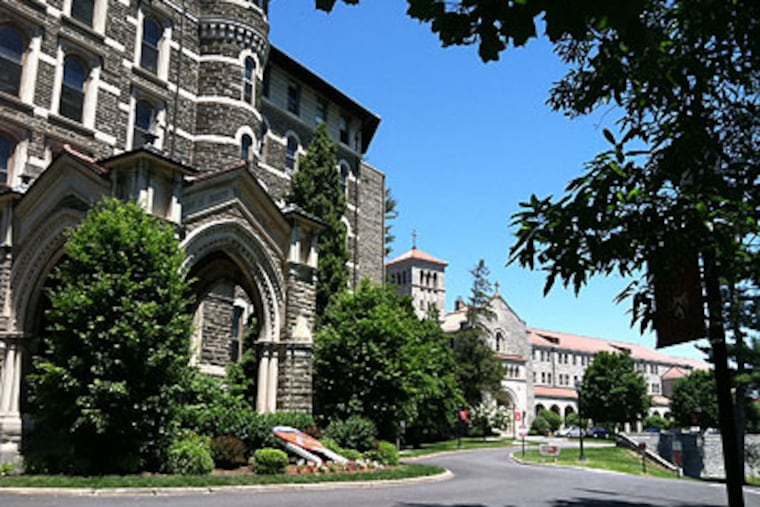Chestnut Hill College to launch $500 million expansion
After a year and a half of negotiations with community organizations, Chestnut Hill College, a small coed institution on the northwest edge of Philadelphia, is set to move ahead with a long-term development plan, despite the lingering concerns of two neighborhood groups.

After a year and a half of negotiations with community organizations, Chestnut Hill College, a small coed institution on the northwest edge of Philadelphia, is set to move ahead with a long-term development plan, despite the lingering concerns of two neighborhood groups.
The college, on rolling hills in the 9600 block of Germantown Avenue, plans to launch a multi-decade $500 million development project that will include nine new buildings on the 32-acre property known as Sugarloaf, adjacent to its 45-acre main campus.
At Bells Mill Road and Germantown Avenue, the Sugarloaf site, which the college bought from the Albert M. Greenfield Foundation in 2006, is key to the expansion, officials said.
The goal of the college, established in 1924 by the Sisters of St. Joseph, is to increase the number of full-time undergraduates from the current 900 to 1,500 over the next few years, said Sister Carol Jean Vale, college president.
The college, with gray stone buildings with terra cotta roofs, also has about 600 evening undergraduate students and about 800 graduate students, she said.
Vale said the expansion plan was "critically important" to the college, which had been a women-only institution until going coed in 2003. Over the last few years, undergraduate enrollment has nearly doubled, Vale said.
"We have taken into account our vision for the future, and we have benchmarked against the schools with which we want to compete," Vale said.
She said the college had examined its plans "from every perspective and point of view and determined that we need to grow to 1,500 full-time undergraduate students."
Some neighbors, who say they may seek legal recourse if the current plan is approved, raised objections over increased auto traffic, environmental issues, and the view from surrounding roads.
The City Planning Commission approved the master plan on April 19.
The plan calls for a zoning change from residential to an institutional development district so the college will not have to seek approval for each new building on both campuses.
Councilwoman Donna Reed Miller, whose Eighth District covers the campus, has introduced an ordinance to designate the area an institutional development district. The measure is scheduled for a Council hearing on Tuesday and could be approved before Council adjourns later this month.
College officials spent 18 months in meetings with a nine-member negotiating committee representing such community groups as the Chestnut Hill Community Association, Chestnut Hill Business Association, and Friends of the Wissahickon.
Walter Sullivan, the departing president of the Chestnut Hill Community Association, said all but two community groups supported the expansion plan.
Leaders of the North Chestnut Hill Neighbors and the Northwest Wissahickon Conservancy said they were still not satisfied with the plan.
Robert Shusterman, a lawyer and leader of the North Chestnut Hill Neighbors, said the plan should be delayed because "four or five major issues" need to be resolved.
He said his group would file a lawsuit against the college if Council approves the institutional development district.
Shusterman, who said his group represented about 100 neighboring families, said that the college did not have an adequate storm-water management plan and that further protections were needed for the Wissahickon Creek.
He noted that the college had agreed to several conservation easements, essentially agreements to restrict construction in certain areas to protect the environment and aesthetics, such as the views.
Shusterman said that because the college had a mortgage on the Sugarloaf property, it would need approval of the mortgage lenders to adopt conservation easements.
Kathleen Spigelmyer, a spokesman for the college, said it was waiting to hear from its banks to see whether granting the easements would be possible.
Councilwoman Miller said the college's plan was more than reasonable. "I think it draws a good balance between the things that the neighbors want in terms of conservation and green space.
"I think the plan also respects the nearby neighbors, and it's good economic development. You're never going to please everybody."
Lawrence D. McEwen, an architect and member of the negotiating committee, agreed the plan was "a positive thing for Chestnut Hill, not the destructive kind of things you've heard from a few folks."
Vale, the college president, said the master plan was "99 percent finished."
"We want the community to be comfortable with what we are doing," she said. "We're simply not going to shut down the conversation after we get the City Council's approval to move forward."